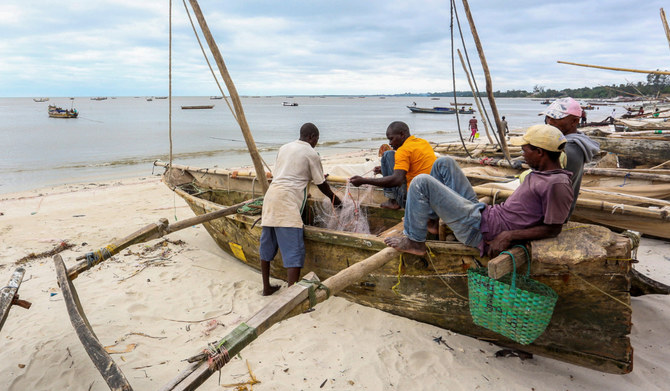NAIROBI: Beaches were deserted and many shops closed on Saturday as heavy rains and winds from a tropical cyclone buffeted coastal areas of Tanzania and Kenya.
Both countries have gone on alert for Tropical Cyclone Hidaya, after weeks of torrential rains and floods that have wreaked havoc in many parts of East Africa and claimed more than 400 lives.
But there were no reports of casualties or damage as of Saturday afternoon as the cyclone rolled in from the Indian Ocean and made landfall in Tanzania.
“It’s so strange today to see only few people at the beach. We are used to seeing crowds, especially during the weekend,” said Yusuf Hassan, a resident of Tanzania’s main city Dar es Salaam.
“But I am sure people are afraid of the cyclone.”
The Kenya Meteorological Department said the cyclone was already being felt offshore, with strong winds exceeding 40 knots and waves of over two meters (over six feet).
It forecast heavy rainfall along the coast from Sunday, intensifying over the following two days, but said Kenya would only feel the effects of the cyclone from the “fringes” because of its location on the equator.
Interior Minister Kithure Kindiki announced a ban on all beach activities, swimming and fishing.
The Tanzanian Meteorological Authority said there had been strong winds and heavy downpours along the coast overnight.
In the Mtwara area, it said over 90 millimeters (3.5 inches) of rain had been reported in 24 hours, nearly twice the average May rainfall of 54 millimeters.
The agency advised people living in risk-prone areas and those involved in marine activities to take “maximum precautions.”
In the Zanzibar archipelago, all marine transport has been suspended.
“We believe it’s not safe to travel under such weather conditions caused by the cyclone,” Zanzibar Maritime Authority director general Sheikha Ahmed Mohamed told AFP.
Cyclone season in the southwest Indian Ocean normally lasts from November to April and there are around a dozen storms each year.
Kenyan President William Ruto on Friday described the weather picture as “dire” and postponed the reopening of schools indefinitely, with the approach of what he said was the nation’s first-ever cyclone.
Around 210 people have died in Kenya from flood-related incidents and nearly 100 are missing.
A further 165,000 have been forced to flee their homes, according to government data.
“No corner of our country has been spared from this havoc,” Ruto said in a televised address, blaming the devastating cycle of drought and floods on a failure to protect the environment.
“Sadly, we have not seen the last of this perilous period.”
On Thursday, the interior ministry ordered anyone living near major rivers or dams to leave the area within 24 hours or face “mandatory evacuation for their safety.”
It warned that 178 dams and reservoirs were at risk of spilling over.
Kindiki said 138 camps have been set up to offer temporary shelter to more than 62,000 people displaced by floodwaters.
Opposition politicians and lobby groups have accused the government of being unprepared and slow to respond despite weather warnings.
At least 155 people have also been killed in Tanzania by floods and landslides that have swallowed homes and destroyed crops.
East Africa is highly vulnerable to climate change and this year’s rains have been exacerbated by El Nino — a climate phenomenon typically associated with increased heat that leads to drought in some parts of the world and heavy downpours elsewhere.
Torrential rains have claimed at least 29 lives in Burundi since September, while weather-related deaths have also been reported in Ethiopia, Rwanda, Somalia and Uganda.
Late last year, more than 300 people died in rains and floods in Ethiopia, Kenya and Somalia, just as the region was trying to recover from its worst drought in four decades.





























